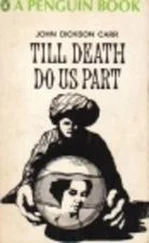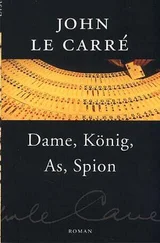“I interviewed you once,” said Barbara shakily, “for the Morning Record. You talked a good deal, but you wouldn't give m permission to print much of it.”
“Right,” agreed Hadley, and looked at her. “You're Miss Morell, of course.” He looked thoughtfully at Miles. “And you must be Mr. Hammond. You seem to have got yourself pretty thoroughly soaking wet.”
“It wasn't raining when I left home.”
“Always wise,” said Hadley, shaking his head, “to take a raincoat when you go out in these days. I could lend you mine, only I'm afraid I'm going to need it myself.”
The studiedly social air of all this, with its element of deadly danger and tension underneath, couldn't go on for long. Miles broke it.
“Look here, Superintendent!” He burst out. “You didn't come here to talk about the weather. The main thing is—you're a friend of Dr. Fell.”
“That's right,” agreed Hadley. He came in, removed his hat, and closed the door.
“But Dr. Fell said the police weren't going to be brought into this!”
“Into what?” Hadley asked politely, with a slight smile.
“Into anything!”
“Well, that depends on what you mean,” said Hadley.
His eyes wandered round the room: at Fay's handbag and black beret on the bed, at the big dusty tin box drawn out from under the bed, at the drawn curtains on the two little windows. His gaze rested, without apparent curiosity, on the brief-case lying there conspicuously under the light over the chest-of-drawers.
Miles, his right hand tightly clutching the sheaf of banknotes in his pocket, watched him as you might watch a tame tiger.
“The fact is,” Hadley pursued easily, “I've had a very long 'phone conversation with the maestro . . .”
“With Dr. Fell?
“Yes. And a good deal of it wasn't quite clear. But it seems, Mr. Hammond, your sister had a very bad and dangerous scare last night.”
Fay Seton moved round the big tin box and picked up her handbag from the bed. She went to the chest-of-drawers, tilted the mirror above it so as better to catch the light, and set about with handkerchief and powder to remove the traces of tears. Her eyes in the mirror were blank, like blue marbles; but her elbow quivered frantically.
Miles clutched the banknotes.
“Dr. Fell told you what happened at Greywood?” he asked.
“Yes.”
“So the police have to be called in?”
“Oh, no. Not unless we're asked. And in any case you'd approach toe police of the district; not London. No,” said Hadley in a leisurely way, “what Fell really wanted was to know the name of a certain test.
“Certain test?”
“A scientific test to determine . . . well, what he wanted to determine. And whether I could tell him anyone who knew how to carry it out. He said he couldn't remember the name of the test, or anything much about it except that you used melted paraffin.” Hadley smiled slightly. “He meant the Gonzalez test, of course.”
Then Superintendent Hadley moved forward.
“Dr. Fell also asked me,” he went on, “whether we had any means of finding out Miss Seton's address, in case you”--he looked at Miles--”in case you by any chance missed her. I said naturally we had, since she must have taken out an identity card.” Hadley paused. “By the way, Miss Seton, have you got your identity card?”
The reflection of Fay's eyes regarded him in the mirror. She had almost finished making up; her hands were steady.
“Yes,” answered Fay.
“As a matter of form, may I see it?”
Fay took the card out of her handbag, gave it to him without comment, and turned back to the mirror. For some reason the look of wild strain was returning to her eyes as she picked up the powder compact again.
(What, thought Miles, is going on under all this?)
“I notice, Miss Seton, that this doesn't give any last address.”
“No. I've been living for the past six years in France.”
“So I understand. You've got a French identity card, of course.”
“I'm afraid not. I lost it.”
“What was your means of employment in France, Miss Seton?”
“I had no fixed means of employment.”
“Is that so?” Hadley's dark eyebrows went up, in contrast to the polish of his steel-grey hair. “Must have been a bit difficult to get rations there, wasn't it?”
“I had no—fixed means of employment.”
“But I understand you've trained professionally both as librarian and as secretary?”
“Yes. That's true.”
“In fact, come to think of it, you were employed as secretary by a Mr. Howard Brooke before his death in nineteen thirty-nine. Now there,” observed Hadley, as though suddenly struck by a new idea, “there's a case where we should be glad of a bit of help, to pass on to our French colleagues.”
(Watch the immense cat approach! Watch its devious courses!)
“But I was forgetting,” said Hadley, dismissing this so instantly that all three of his listeners jumped, “i was forgetting the real reason why I came here?”
“The real reason why you came here?”
“Yes, Miss Seton. Er—your identity car. Don't you want it back?”
“Thank you.”
Fay was compelled to turn around. She took the card from him; and then, in her grey dress and long damp tweed coat, sh stood with her back to the chest-of-drawers. Her body now hid the brief-case, which seemed to shout to heave. If Miles Hammond had been a thief with every seam of his pockets lined with stolen property, he could not have felt guiltier.
“Dr. Fell asked me,” pursued Hadley, “in a strictly unofficial way to keep an eye on you. It seems that you ran away from him . . .”
“I don't think I quite understand. I didn't run away.”
“With the intention of coming back again, of course! That's understood!”
Fay's eyes closed spasmodically, and opened again.
“Just before then, Miss Seton, Dr. Fell was going to ask you something very important.”
“Oh?”
“He instructed m to tell you that he hadn't put the question last night,” continued Hadley, “because he didn't guess then what he guesses at the present time. But he wants very much to have an answer to that question.” Hadley's tone changed only slightly; it was still polite, still casually inquiring; but the whole room seemed to grow warmer as he added:
“May I ask that question now?”
Chapter XVII
The hanging light over the chest-of-drawers shone down on Fay's hair, and brought out the warmth of it in contrast to the apparent coldness of her face and body.
“A question about . . .?” Her hand—Miles could have shouted a warning—instinctively moved toward the brief-case behind her.
“A question,” said Hadley, “In connection with the frightening of Miss Marion Hammond last night.” (Fay's hand darted back again; she straightened up.)
“And I'm afraid,” continued Hadley, “I must preface it by getting the situation clear. Don't mind my notebook, Miss Seton! It's not official. I've only put down what Fell asked me to put down.” His eyes strayed o the identity card in her hand. “Or do you refuse to answer questions, Miss Seton?”
“Do I ever—refuse?”
“Thank you. Now then: with regard tot the frightening of Miss Marion Hammond . . .”
“I didn't do it!”
“You may not be always conscious,” sad Hadley, “of what you do or the effect it has.”
Hadley's voice remained quiet when he said this.
“However!” he added quickly, and there was a penetrating quality about his gaze which made the eyes seem to grow larger. “We're not talking now about your conscious guilt or innocence in anything. I'm only trying (what shall I say?) to get this picture clear. As I understand it, you were the last person known to be with Marion Hammond before she was—frightened?”
Читать дальше










